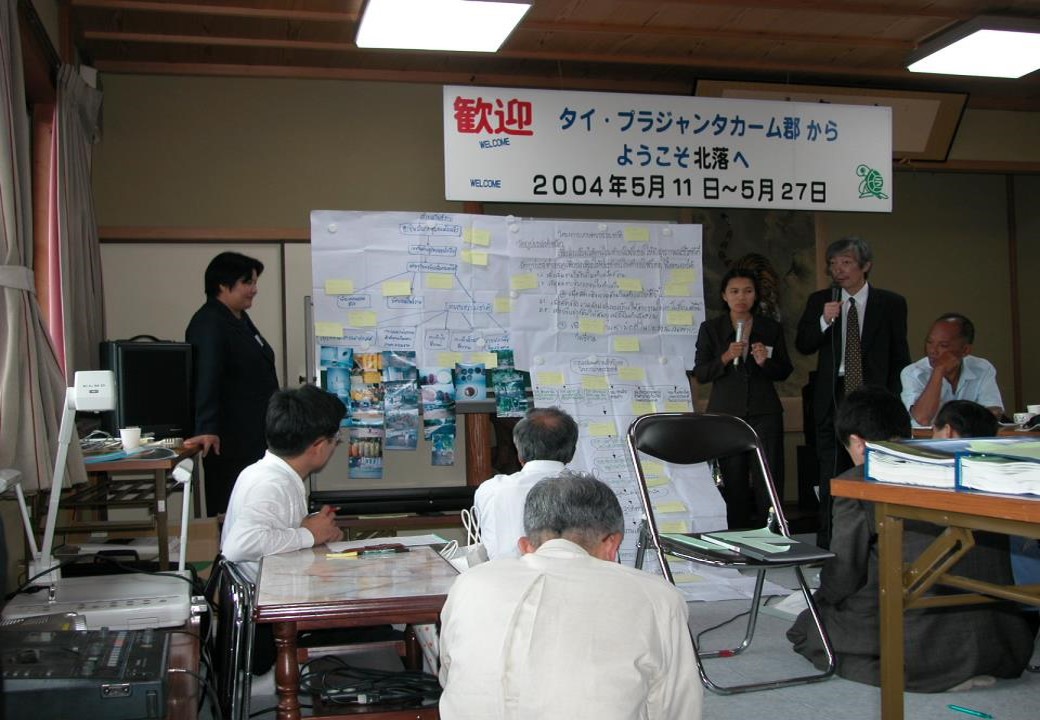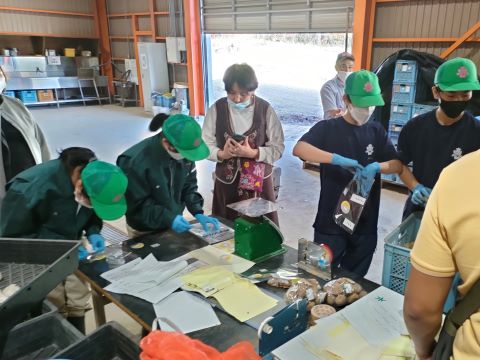International Cooperation and Japan’s Local Innovation : (2) A Global Bond Born Two Decades Ago
2023.10.19
-

- Kimata Yoichiro Representing Director for Eastern Hokkaido JICA Hokkaido (Obihiro)
Japan’s Local Innovation and international cooperation have a long history, extending beyond the present day. This time, I would like to share an episode from about 20 years ago, when I worked for JICA Thailand office. This episode illustrates the cross-border bonds of community development that were forged through international cooperation.
Koura Town, located in the eastern part of Lake Biwa in Shiga Prefecture, has been a town where residents actively engaged in beautiful environment since the "Small Stream (Seseragi) Playtown Development" project in the 1990s.
From 2002 to 2004, We arranged to host training programs three times for those involved in the "Project on Capacity Building for Planning Management of Local Authorities", which aimed to promote community-based development in Thailand.
During these training programs, following the experiences of Koura Town's residents, trainees walked through communities, interviewed residents, took photos of the community resources and issues as seen through the trainees' eyes, and then mapped these observations. The results of this effort were presented with the participation of the local residents, and discussions ensued based on the insights gained from the trainees.

As a result of this process, the trainees deepened their own learning. Moreover, it turned out that the residents of Koura Town, who hosted the trainees, also had many realizations. Observing a discarded pencil case, one trainee asked, "Is this considered as garbage?" They were taught the importance of not generating waste in the first place, before even considering waste separation. Another trainee questioned why some projects were not completed as planned when looking at the community development plan. The dialogue with the trainees served as a stimulus, leading to the progress of community development in Koura Town and the nurturing of local talents.
I was in charge of this project at the Thailand office at the time, and I received a startling news. The residents of Koura had saved their money and came to Thailand at their own expense.
Given that numerous trainees from Thailand were coming to Koura Town, the residents of Koura felt that it was important to visit there and see firsthand what it was like in order to better understand the trainees. And in 2004, 11 residents from Koura Town visited the project sites in Thailand.
The residents of Koura Town walked through the villages of the project sites, found out what they were doing well and what were still challenges, and discussed with the villagers about them. This was the moment when I realized that this is true "technical cooperation" that cannot be replaced by anything else. One of the participants from Koura Town said, "When we actually went to Thailand, we realized that there was a speed that suited the local people. We may have missed some things by speeding up our actions. In that point, it gave us a chance to reevaluate the region at the original human pace."
The exchange between residents transcending national borders has contributed to the development of both Thailand and Koura Town.
Thus, the JICA project ended in 2004. However, at that time, the mayer of the project site in Thailand approached us about exchanging human resources and products with Koura Town, and in November 2006, the exchange agreement was signed between the village of Yaan, Pohgam Town, Thailand and the Kitaochi District of Koura Town.

In September 2009, 17 children from the Kitaochi district visited Thailand, and in October 2011, five children from Yaan Village visited Kitaochi district. If children who shared the same experiences can eventually reunite with their own children when they grew up in the future, it will be a sustainable exchange promoting local community growth. One of the Kitaochi residents involved in the signing of the agreement recalls:
"The agreement is a long-awaited step in the process of establishing a relationship with Thailand. The agreement is like putting a "burden" on us in a positive sense, in order to make the exchange with Thailand last longer. We thought that the money could be used for the children of the village, just as if we were building a park in the village.
As a first step toward realizing this dream, Koura Town established its own international exchange planning staff in 2008 and invited Thai staff involved in the JICA project. In addition to promoting exchange programs with Thai villages, the Thai staff introduced Thai culture to a wide range of people from children to the elderly in Koura Town, thereby promoting multicultural coexistence not only with Thai people but also with other foreigners living in the town. After the two-year term of the International Exchange Coordinator ended, the Multicultural Circle was established as a non-profit organization, and these efforts were carried on.
In 2006, I returned from Thailand and visited Koura Town before the signing of the agreement. One of the members of the self-funded Thai delegation said to me, "While JICA's project has been over, those who were involved in it have developed a passion for our activities and will continue to strengthen our exchange with Thailand. Nevertheless, can JICA simply call it quit now that their own project is over?"
At that time, I felt like I had been hit over the head with a hammer. I was delighted that the JICA project had ignited enthusiasm among the people of Koura Town for engaging with Thailand. However, on the other hand, I found myself in a dilemma, wondering if I should be part of this initiative. This experience still serves as the driving force behind my activities, which aim to connect Japan and foreign countries.
These examples show that international cooperation does not necessarily have the effect of directly revitalizing local economies and industries, but rather can be expected to improve the "capacity" to promote the region in the future. Although this episode took place almost 20 years ago, the lessons learned from it have not faded away.
(To be continued)

International Cooperation and Japan’s Local Innovation: (4) A New Era of International Cooperation Co-Created from Local Innovation

International Cooperation and Japan’s Local Innovation : (3) Lessons Learned at the sites striving for Revival from Great East Japan Earthquake

International Cooperation and Japan’s Local Innovation : (1) Connection between “International” and “Local”
scroll